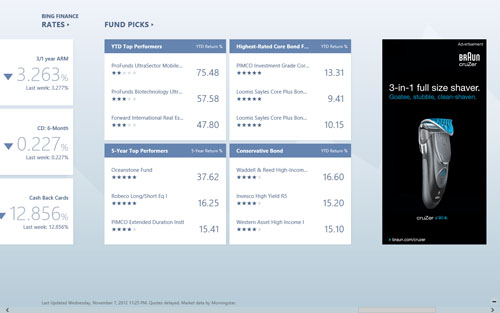Yes, Microsoft was not only braindead enough to force a butt-ugly touchscreen interface on the desktop, even though the amount of people actually having touchscreens is in the lower one-digit range.
Let's not mention the crippled desktop either, which intentionally had the start menu removed, so you're forced to use that abysmal Metro to launch apps. Or that all apps launched by Metro run maximised now, if you want it or not.
Let's also not mention all the other stuff that MS changed arbitrarily, and which makes Windows 8 an even much bigger pain in the arse to use than the above already does.
No, MS did even more: They are including ads in an OS that you were stupid enough to pay good money for. Ok, if you bought Windows 8, you're already an extreme masochist, but still... (unless you just bought a new laptop or pre-built PC and were *forced* to buy it along with it.)
Now the "Shopping lense" suggestions in the new Ubuntu Unity already proved very controversial, but they're quite unintrusive, and you can easily disable or even uninstall it (or even better, use Kde instead of stupid Gnome in the first place).
Not so with Windows 8. There's no way to disable the ads - after all, MS wants to make lots of $$$ off you by selling space in your apps to advertising companies. The ads are also *way* more intrusive than what the shopping lens does, taking up ample space. Yes, I know that no one asked you if you want ads in your apps, but when did MS ever ask you if you want something or not? ... Exactly.
A few examples:
"Oh, going to visit the stock exchange today? Be sure to shave yourself properly before, using the new Braun 3-in-1 full size shaver!"

"Oh no, just look at that weather, and what it does to your hair. Use the new Pantene shampoo now to erase the damage!"

Also, take a look on how you have a black ad on a very light background and a white ad on a dark background, to make sure the ad jumps at you the instant you open the app. After all, it's the most important part of the app now (for MS, at least).
Finally, there's still another thing you should be concerned about - tracking. There's a very good chance that MS will be tracking what ads you click and then seel those profiles to the ad companies as well. From the article:
"We can't talk about the inclusion of ads and not mention the "T" word: tracking. I haven't been able to find any information on whether or not Microsoft's tracking the ads you are clicking on, but if that is indeed the case, we'll find out soon enough. Unlike Windows 7 and earlier, your entire Windows 8 account can be tied to an e-mail account, so it would be rather easy for Microsoft to track things on a personal level - much like how Google does with its search engine, e-mail and so forth. This alone gives good reason to be concerned."
All that makes Windows 8 even more "fun" to use than it already is XD
Source: http://hothardware.com/News/Microsof...n-Advertising/
Let's not mention the crippled desktop either, which intentionally had the start menu removed, so you're forced to use that abysmal Metro to launch apps. Or that all apps launched by Metro run maximised now, if you want it or not.
Let's also not mention all the other stuff that MS changed arbitrarily, and which makes Windows 8 an even much bigger pain in the arse to use than the above already does.
No, MS did even more: They are including ads in an OS that you were stupid enough to pay good money for. Ok, if you bought Windows 8, you're already an extreme masochist, but still... (unless you just bought a new laptop or pre-built PC and were *forced* to buy it along with it.)
Now the "Shopping lense" suggestions in the new Ubuntu Unity already proved very controversial, but they're quite unintrusive, and you can easily disable or even uninstall it (or even better, use Kde instead of stupid Gnome in the first place).
Not so with Windows 8. There's no way to disable the ads - after all, MS wants to make lots of $$$ off you by selling space in your apps to advertising companies. The ads are also *way* more intrusive than what the shopping lens does, taking up ample space. Yes, I know that no one asked you if you want ads in your apps, but when did MS ever ask you if you want something or not? ... Exactly.
A few examples:
"Oh, going to visit the stock exchange today? Be sure to shave yourself properly before, using the new Braun 3-in-1 full size shaver!"

"Oh no, just look at that weather, and what it does to your hair. Use the new Pantene shampoo now to erase the damage!"

Also, take a look on how you have a black ad on a very light background and a white ad on a dark background, to make sure the ad jumps at you the instant you open the app. After all, it's the most important part of the app now (for MS, at least).
Finally, there's still another thing you should be concerned about - tracking. There's a very good chance that MS will be tracking what ads you click and then seel those profiles to the ad companies as well. From the article:
"We can't talk about the inclusion of ads and not mention the "T" word: tracking. I haven't been able to find any information on whether or not Microsoft's tracking the ads you are clicking on, but if that is indeed the case, we'll find out soon enough. Unlike Windows 7 and earlier, your entire Windows 8 account can be tied to an e-mail account, so it would be rather easy for Microsoft to track things on a personal level - much like how Google does with its search engine, e-mail and so forth. This alone gives good reason to be concerned."
All that makes Windows 8 even more "fun" to use than it already is XD
Source: http://hothardware.com/News/Microsof...n-Advertising/








 My condolences to your misfortune.
My condolences to your misfortune.
Comment